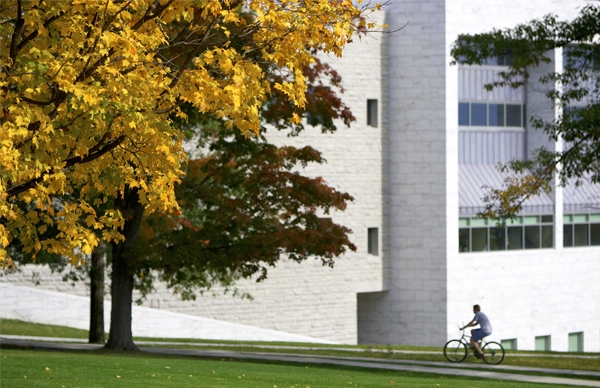Mellon Grant Will Support Revamping Infrastructure for Digital Scholarship

MIDDLEBURY, Vt. – A new grant from the Andrew W. Mellon Foundation will support an effort to study the current state of digital scholarship infrastructure in the U.S. and to help envision a more modernized and sustainable system that would enhance scholarly communication at colleges, universities, and research libraries across the country.
Middlebury’s Dean of the Library Michael Roy will lead the multischool team of library professionals to complete the $100,000 project over the next two years. He will be joined in this effort by David Lewis, former dean of the university library at Indiana University–Purdue University Indianapolis, and Katherine Skinner, executive director of the Educopia Institute. The core team will work with advisory committees composed of higher education and research professionals from a wide variety of institutions.
“Unsurprisingly, given the diversity of scholarly practice across disciplines and the widely distributed nature of higher education, the tools and services to support scholarship in this digital world developed in an opportunistic yet uncoordinated way,” said Roy.
One of the biggest challenges to growth in digital scholarship, says Roy, is the fragmented way in which research and academic libraries have developed their systems as they try to support both legacy print materials and new digital environments. Rising costs for journals and fiscal restrictions in higher education have stymied the development of a comprehensive and coordinated infrastructure.

The new grant will focus on an inventory of the infrastructure—the systems and services that make scholarship discoverable, as well as those that preserve it—and an initial investigation of how it might best be improved. This study will include computer systems and software as well as the human resources necessary to manage the creation, maintenance, and use of the systems.
“There is a strong desire in the library community for a road map that includes not only technical requirements, but also strategies for the financing and governance of academy-owned and -controlled infrastructure,” said Skinner. “Currently many library leaders feel a sense of platform fatigue because they are paying for multiple uncoordinated projects. We expect this project to create the grist from which such a road map can be created, and expect to make recommendations to advance this goal.”
U.S. academic libraries spend an estimated $8 billion annually. One of the key questions the grant project will explore is whether 2.5 percent of that amount—$150 to $200 million per year—would be sufficient to create and support an infrastructure to provide access to the scholarly research outputs.
“We believe a benchmark figure of this sort is critical so that libraries and their parent institutions may evaluate their current levels of investment and plan accordingly for the future,” said Lewis, who authored an article that inspired this project, which posits that every academic library should commit to contribute 2.5% of its total budget to support the common infrastructure needed to create the open scholarly commons.
During the ambitious project, the teams will conduct a literature review and focus groups, develop a census of infrastructure, map the scholarly publishing system, write case studies of infrastructure providers, survey the investment in infrastructure by colleges and universities, and produce a report synthesizing the group’s research findings and recommending “promising directions to sustain and grow investment in this infrastructure.”
“Some members of the scholarly community believe that the current system would be improved and made more sustainable if it were replaced by a commons, funded and built by the scholarly communities,” said Roy. “This project will provide key information needed to test that hypothesis and help envision a path forward.”

